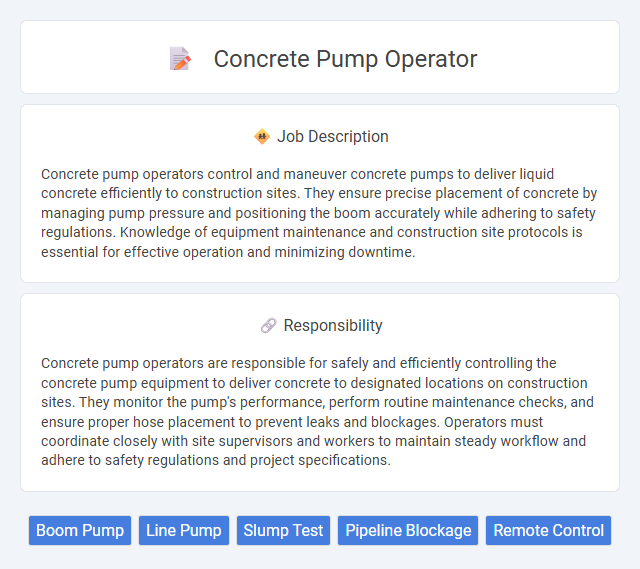
Concrete pump operators control and maneuver concrete pumps to deliver liquid concrete efficiently to construction sites. They ensure precise placement of concrete by managing pump pressure and positioning the boom accurately while adhering to safety regulations. Knowledge of equipment maintenance and construction site protocols is essential for effective operation and minimizing downtime.
Concrete pump operators will probably be well-suited for individuals with strong physical stamina and good hand-eye coordination, as the job often requires operating heavy machinery in various weather conditions. Those who prefer dynamic, outdoor work and can maintain focus under pressure are likely to thrive in this role. People with sensitivity to vibrations or difficulties standing for long periods might find this job less suitable.
Qualification
A concrete pump operator must possess a valid commercial driver's license (CDL) and complete specialized training in operating concrete pumping equipment safely and efficiently. Knowledge of hydraulic systems, job site safety protocols, and proper maintenance procedures is essential to ensure smooth operation and prevent accidents. Certification from recognized industry organizations, such as the National Association of Concrete Pumping Specialists (NACPS), enhances employment prospects and demonstrates professional competency.
Responsibility
Concrete pump operators are responsible for safely and efficiently controlling the concrete pump equipment to deliver concrete to designated locations on construction sites. They monitor the pump's performance, perform routine maintenance checks, and ensure proper hose placement to prevent leaks and blockages. Operators must coordinate closely with site supervisors and workers to maintain steady workflow and adhere to safety regulations and project specifications.
Benefit
Concrete pump operators likely experience benefits such as competitive wages and opportunities for overtime pay due to demand in construction projects. Job stability may increase given the consistent need for skilled operators in residential, commercial, and infrastructure developments. Access to on-the-job training and certifications could enhance career growth and earning potential within the industry.
Challenge
Operating a concrete pump likely presents challenges related to equipment calibration and precise timing to ensure efficient and safe concrete placement. The complexity of coordinating between the pump operator, ground crew, and pouring team may increase the risk of delays or errors on job sites. Adapting to varying site conditions and troubleshooting mechanical issues could demand strong problem-solving skills and attention to detail.
Career Advancement
Concrete pump operators can advance their careers by gaining certifications like NCCCO and acquiring specialized skills in handling complex pumping systems. Mastery of safety protocols and expertise in maintaining pump equipment increase opportunities for senior operator or site supervisor positions. Experienced operators often transition into roles such as operations manager or technical trainer, leveraging their practical knowledge to lead teams and improve project efficiency.
Key Terms
Boom Pump
A Concrete Pump Operator specializing in Boom Pumps expertly controls telescopic or articulating booms to deliver concrete with precision and safety on construction sites. Mastery of hydraulic systems and adherence to OSHA safety standards ensure efficient placement of concrete for high-rise buildings and large-scale infrastructure projects. Proficient operators coordinate with ground crews to maintain consistent flow rates, minimizing delays and optimizing project timelines.
Line Pump
A concrete pump operator specializing in line pumps manages the precise delivery of concrete through flexible hoses to specific locations on construction sites. Expertise in setting up and maneuvering the lightweight, truck-mounted line pump ensures efficient and controlled concrete placement in confined or hard-to-reach areas. Mastery in maintaining pump pressure, monitoring flow rates, and troubleshooting hose blockages is critical for maximizing productivity and maintaining safety standards.
Slump Test
Concrete pump operators ensure precise delivery of concrete by monitoring slump tests to verify the mix's consistency and workability. The slump test measures the concrete's fluidity, helping operators adjust pump pressure and flow rate for optimal placement without segregation or blockages. Mastery of slump test results enhances job site efficiency, reducing delays and ensuring structural integrity.
Pipeline Blockage
Concrete pump operators play a crucial role in ensuring the continuous flow of concrete through pipelines, preventing costly delays caused by blockages. They continuously monitor pressure gauges and listen for unusual noises that indicate potential pipeline clogging, while promptly performing cleaning or flushing procedures to clear hardened concrete. Skilled operators reduce downtime and maintain efficient construction workflows by effectively managing and preventing pipeline blockages during concrete pumping.
Remote Control
Concrete pump operators utilize remote control technology to precisely maneuver the boom and deliver concrete efficiently on construction sites. Mastery of remote control systems enhances safety by allowing operators to maintain a safe distance from moving machinery and uneven terrain. Proficient handling of these advanced controls ensures consistent concrete flow, minimizing spillage and project delays.
 kuljobs.com
kuljobs.com